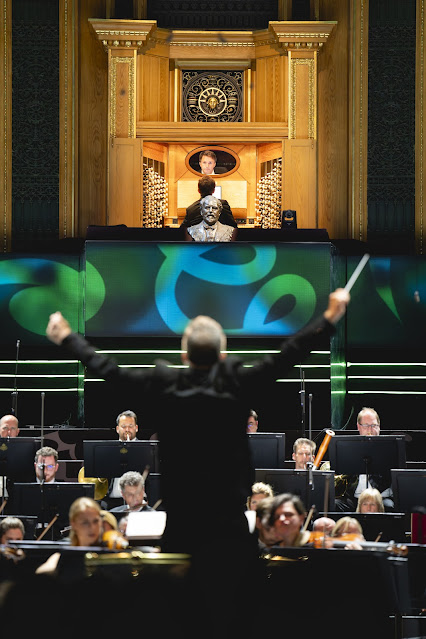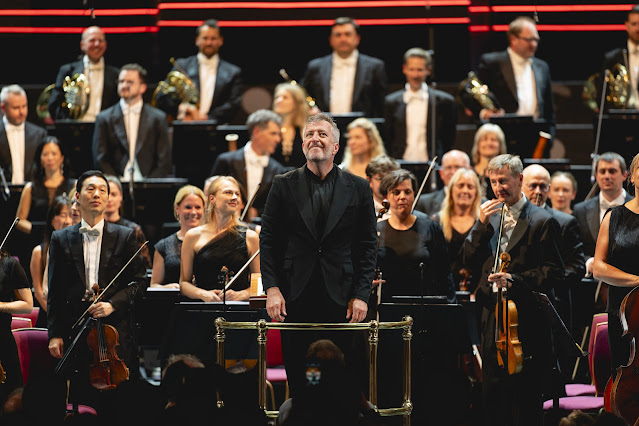 |
| Gabriella Smith: Breathing Forests – James McVinnie, Thomas Adès, BBC Symphony Orchestra BBC Proms (Photo: Andy Paradise/BBC) |
Sibelius: The Swan of Tuonela, Gabriella Smith: Breathing Forests, Thomas Adès: Five Spells from The Tempest, Sibelius: The Tempest – Suite No. 1; James McVinnie, BBC Symphony Orchestra, Thomas Adès; BBC Proms at the Royal Albert Hall
Reviewed 2 September 2025
Mixing his own music with that of Sibelius and the UK premiere of a work written for the organ of the Walt Disney Hall in Los Angeles, Thomas Adès demonstrated a remarkable ear for creating sophisticated shifting palates of orchestral colour
When I spoke to organist James McVinnie last year [see my interview with him celebrating the Southbank Centre organ’s 70th birthday], one of the works he mentioned was American composer Gabriella Smith‘s Breathing Forests so it was with great pleasure that we were able to catch McVinnie’s performance in the UK premiere of the work at the BBC Proms.
At the Royal Albert Hall on Tuesday 2 September 2025, Thomas Adès conducted the BBC Symphony Orchestra in a programme that moved from Sibelius’ The Swan of Tuonela to Gabriella Smith’s Breathing Forests (with James McVinnie on the Royal Albert Hall organ), to Adès’ own Five Spells from The Tempest and back to Sibelius with his The Tempest – Suite No. 1.
Sibelius’ The Swan of Tuonela was first performed at the Proms in 1905, nine years after the piece’s premiere in 1896 in Finland as part of the Lemminkäinen Suite and The Swan of Tuonela continued to have an independent life with the complete suite not receiving a Proms performance until 1991. In fact, The Swan of Tuonela started out as an independent work, the prelude to a projected opera.
Adès and the orchestra began as if there was all the time in the world, suspended sounds from the strings with lines arising and disappearing, over these fine solos from cor anglais and cello. There was a flurry of gentle excitement leading towards the horn calls, but always that sense of time suspended, phrases in the air and there was even a gentleness to the big string tune. Throughout you sensed Adès’ ear for bringing out the subtleties of textures.
Gabriella Smith’s Breathing Forests, for organ and orchestra, is a three movement work reflecting on the relationship between humans, forests, climate change and fire. Growing up in California it was perhaps inevitable the fire should play a big role and the three interlinked movements were Grow, Breathe and Burn.
Grow began with shimmering wind and col legno strings, and throughout the whole work I noticed Smith’s fondness for shimmering, flickering textures as if everything was constantly in motion. In the opening movement, bird calls were added and then the organ’s contributions built up. A series of surprising, shimmering textures moved up in pitch until stripped down to the highest. Insistent at times, organ and brass took over, the textures expanding yet movement never ceased until a mammoth organ chord. Few of us, I suspect, have had the chance to hear the Royal Albert Hall organ quite like this. The sense of growth and expansion continued and then evaporated to return to the opening, suggesting an ever-present cycle. For Breathe, magical string texture swirled around the sustained organ contribution. As the orchestra ebbed and flowed over the slow build of the organ, one rather marvelled at Smith’s remarkable ear for timbre and texture. Bird calls and fluttering textures contributed to the mix, but a brass climax let to another powerful organ statement with James McVinnie, I think, leaning his forearms on the keyboard. Burn began with scratching on the strings, creating a striking and disturbing backdrop to the development of more complex lines, yet with an underlying rhythm that continued. The organ’s contributions here were largely sustained notes, even as the orchestra reverted to its earlier flickering. A slow, intense build up, including some amazing whoops led to a climax which seemed to repeatedly advance and retreat.
Not a concerto, then, in the conventional sense, there were many moments when Smith seemed to merge the organ with the orchestra, and at other times its sheer power was an overwhelming presence yet the work had real delicacy too. With James McVinnie immured in his distant eerie, it was the sort of work where I wished there had been a camera feed and screens to give a close up of him in action.
After the interval we had two very different dramatic views of Shakespeare’s The Tempest. First Thomas Adès’ 2022 orchestral work, Five Spells from The Tempest which reworks material from his 2003 opera.
First Overture (Storm) set the scene, beginning with vivid excitement and restless churning that built to a climax which slowly unwound. Ariel and Prospero introduced each and set them in dialogue, Ariel all jagged high woodwind (in the opera the character is a stratospheric coloratura soprano) and Prospero in the brass, the dialogue leading to significant excitement. It was notable the way Adès used the large orchestra not for sheer volume but as a dazzling palate of colours. Ferdinand and Miranda was based around their love duet (not in the play, but an invention of librettist Meredith Oakes), though at one point they are disturbed by Prospero. Lyrical wind combined with shimmering strings, with lovely fluid lines. Prospero’s brass interruption created a climax but the opening returned, more intense and restless. The Feast featured Ariel’s temptation of the courtiers, and Gonzalo’s aria of a Utopian vision (again, not in the play). Again high lines, and harmonics the whole having an exotic feel that darkened and deepened. Finally Prospero’s Farewell – Caliban took us through the final moments, eventually leaving Caliban alone. Strong, intense orchestral textures featured an intimate cello melody leading to a section where instrumental lines floated in fluid textures ultimately evaporating.
By contrast, Sibelius’ music for The Tempest was originally written for a production of the play at the Royal Theatre in Copenhagen in 1926. The full music has over 30 movements and includes singers and chorus. This music and the tone poem, Tapiola from 1926 would be the last major works Sibelius wrote. His Seventh Symphony from 1924 was never ever followed by the long-promised eighth. In 1927, however, he reorchestrated and reorganised the music from The Tempest into two suites, the movements not completely conforming to the dramatic sequence. Where Adès’ suite concentrated on the key protagonists, Sibelius mined music for the various incidental and comic moments in the play as well, creating a sequence of short, characteristic pieces.
The Oak began with angular chords leading to a mysterious cool flute solo amidst disturbing surroundings. In the original production, Ariel was disguised as an oak and played one of the branches. Humoreske was delightfully perky, with clarinets to the fore, then the restless and changeable Caliban’s Song had the feel of an exotic dance, sometimes with Grieg-esque moments. The Harvesters was a quiet and scurrying dance, whilst Canon mixed horns with vigorous strings. Scene moved from pizzicato strings with chattering wind to a vigorous country dance. Intrada – Berceuse began with dark intense chords yet led to a transparently lovely tender passage for strings and harp. Entr’acte: Ariel’s song was deep, dark and mysterious at first, with a flute solo barely emerging. Finally barely there scurrying strings build to the climax of The Storm with its wind whistling and waves gusting.
 |
| Thomas Adès, BBC Symphony Orchestra – BBC Proms (Photo: Andy Paradise/BBC) |
This was a concert that brought a varied programme together in a way that was quietly satisfaction as you teased out a variety of influences and links. Throughout, whether conducting his own music or that of others, Thomas Adès demonstrated a remarkable ear for creating sophisticated shifting palates of orchestral colour with the ever-responsive BBC Symphony Orchestra.
The blog is free, but I’d be delighted if you were to show your appreciation by buying me a coffee.
Elsewhere on this blog
- BBC Proms: Shostakovich’s Lady Macbeth from massed BBC & ENO forces but Amanda Majeski’s Katerina triumphs – opera review
- BBC Proms: Vital & involving, Peter Whelan & the Irish Baroque Orchestra in the Dublin version of Handel’s Alexander’s Feast – concert review
- Up close & personal: a pacey & vivid account of Mozart’s Don Giovanni from Ensemble OrQuesta at the Grimeborn Festival – opera review
- The Glyndebourne Prom: Mozart’s Le nozze di Figaro with a young cast on superb form – opera review
- Ravishing delight: Rebecca Meltzer tells the story of Handel’s Semele with engaging clarity at Waterperry Opera – opera review
- BBC Proms: A performance to treasure as Fabio Luisi & the Danish National Symphony Orchestra celebrate their centenary – concert review
- The sound of Carnival: Eversely Mills the band manager of Metronomes Steel Orchestra on sounds and traditions of steel bands – interview
- Salzburg Festival
- Astonishing kinetic musical theatre: Donizetti’s Maria Stuarda from Ulrich Rasche with Lisette Oropesa & Kate Lindsey – opera review
- Travelling hopefully: defying age & ill health, Daniel Barenboim conducts his West-Eastern Divan Orchestra – concert review
- Youthful tragedy & transcendental mystery: Riccardo Muti & Vienna Philharmonic Orchestra in Schubert & Bruckner – concert review
- Strange & intriguing: Dmitri Tcherniakov directs his first Baroque opera with Handel’s Giulio Cesare – opera review
- Home


.jpg?w=998&resize=998,665&ssl=1)
%20(1).png?w=670&resize=670,446&ssl=1)





